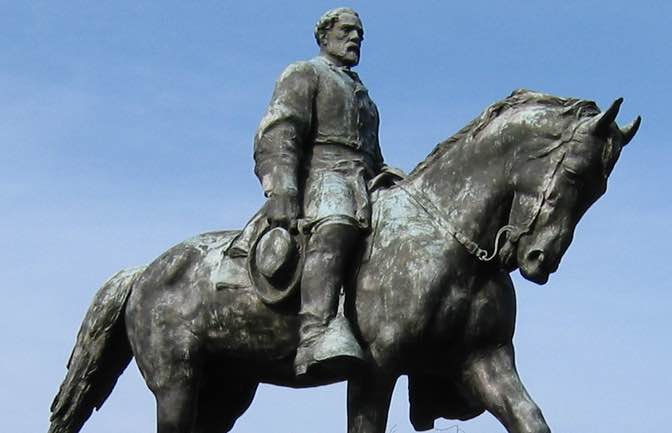On liberty, Confederate monuments, and the Confederacy in general

Hey, world. Long time no post. My only excuse is that I've been dedicating more of my free time recently to stuff other than Steemit, though I've been missing the views and perspectives of the folks I follow. Just so much time in the day. I thought up some stuff I want to address in a post today, though.
Like most Americans, I was quite disturbed by the events that occurred in Charlottesville last Saturday. I suppose, as Americans, we are somewhat spoiled by the fact that our political disagreements rarely end in cold-blooded murder; nonetheless, I hope and pray that it doesn't become standard.
What I want to talk about today, though, is not the protest itself, but what spawned it; the proposed removal of a statue of Robert E Lee, general of the Confederate States of America.
I've heard well-meaning and intelligent people argue that this and similar statues depict figures that are inherently historical and therefore deserve to stay in place. The historicity of the statues are inarguable; nonetheless, statues were and are a symbol of celebration of the figures they depict. Rarely are statues created in western civilization of people utterly despised by those who commissioned the statue. To keep up Lee's statue is to honor his memory.
So what's so bad about Lee compared to Washington or other warrior-leaders in American history? The Confederacy. Yes, I said it.
People will argue that Lee was a man doing his job to the best of his ability and should not necessarily have to bear the sins of the Confederacy as a whole. Or that the Confederacy was an honorable project of standing up to encroaching federal power seeping out of Washington, DC. These are both true, but they paper over the fact that the Confederacy was all about slavery. Yes, I said that too.
It's indeed true to a certain extent that the states that seceded into the Confederacy were fighting for the rights of states to have a greater say in their own governance, but really, the only issue the states cared about in that regard was slavery. I could make a quick but weak observation that no "northern" non-slavery states, which probably had their own concerns about encroaching federal power, elected to join the Confederacy to defend their rights, but I can do better. Check out this comparison of the constitutions of the USA and CSA; they are largely identical, meaning that the CSA one does not grant the states more rights (or prohibit intrusion on state affairs by the federal level) at any significant level. Article 1, Section 9, Clause 4 explicitly states:
No bill of attainder, ex post facto law, or law denying or impairing the right of property in negro slaves shall be passed.
Thus, not only did the CSA's constitution make slavery implicitly legal, it made it constitutionally illegal to restrict repeal it, including at the state or otherwise local level! But state's rights, right?
I would hope that all intelligent people, when being shown the above, would be able to agree that it is thus intellectually dishonest to attempt to dispute or abstract away the direct link between the Confederacy and the Peculiar Institution.
Lee was fighting for the Confederacy. The Confederacy developed to maintain slavery. Lee was fighting to maintain slavery. Call it reductionist, but it is intellectually honest. What the US stood for before, or since, or whether they were right to invade and retake the CSA; all that is immaterial in this regard.
As libertarians and an-caps, slavery should be the most reprehensible thing imaginable to us. It's complete ownership over a person and their output without even the thinnest veneer of due process or respect for civil rights. And those who fought for slavery do not deserve the honor of being preserved in statuary.
Tear down Charlotte's statue of Lee and all other statuary of Confederate "heroes."
We'll get to the statues of American "heroes" later.
My understanding is that the South was paying a much larger percentage of the overall taxes in the nation, and that most of that money was used in the North. This had been going on for years, and was something the Southern people were frustrated about, especially since they did not vote for these taxes. The slavery debate was just the straw that broke the camel's back. If true, this seems like a pretty legitimate reason to want to leave the nation to me. Is this inaccurate information?
You link to the differences in the two constitutions and say the only significant change was the addition of the line about slavery. I read through the link and it seems to me that there were a ton of significant changes not related to slavery. Even if it were accurate that the only significant change in the constitution was about slavery, simply separating from a country which was exploiting you is standing up for state's rights if you had been resisting unfair treatment for years to no avail. Do you disagree?
Other issues that may have contributed to the secession does not change the fact that slavery was ingrained into the political identity of the Confederacy. (And at any rate, why didn't the South just use its disproportionate representation in Congress (due to the three-fifths compromise) to mitigate those taxes?)
Not what I said at all. I just said the two constitutions are largely identical.
I do not disagree. But again, that's immaterial to the slavery issue.